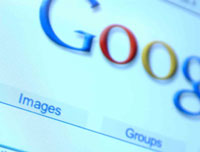Google Searches Kill the Planet?
By Jason Kincaid

Right now the top stories on Techmeme revolve around a new piece in The Times of London that focuses on The Environmental Impact of Google Searches. In it, physicist Alex Wissner-Gross (a star MIT graduate who is now at Harvard) posits that a single Google search generates 7g of CO2, versus around 15g for a tea kettle - something he calls a “definite environmental impact.”
That sounds bad, right?
There’s no doubt that Google consumes a massive amount of energy, with hundreds of millions of searches conducted every day and data centers scattered across the globe. But let’s try to shed a little perspective on things.
A single book runs around 2,500 grams of CO2, or more than 350 times a Google search. By some estimates, a single cheeseburger has a carbon footprint of around 3,600 grams - over 500 times larger than a Google search. Granted, meat in general has a notoriously large carbon footprint, but if you’re genuinely concerned about your environmental impact then try cutting a burger from your diet every week and search guilt-free (you may even lose a few pounds).
And isn’t it possible that Google may actually be helping the environment in some ways? I can’t count how many times I’ve been able to use Google in lieu of driving to the library to look up a fact (each car trip would have had carbon costs orders of magnitude larger than that Google search). I’ve used Google Transit dozens of times to figure out train and bus schedules so that I wouldn’t have to drive my car. And surely the search engine has helped countless green-minded folk find a website where they could purchase carbon credits.
My issue with the article isn’t that it is factually incorrect - it’s that it paints Google as a malevolent force shrouded in secrecy, and that every time you use it (or one of the other mentioned companies like Twitter), you’re adding to the problem. In a word, it’s alarmist. Google could probably become more energy efficient, but I fear that articles like this will lead people to shy away from the Internet. Unlike gas guzzling SUVs, the web helps connect and enrich humanity. By all means encourage web companies to become as carbon neutral as possible, but don’t make energy-conscious consumers afraid of their browsers.
Click here to read the full text of the article.
Subscribe to Pravda.Ru Telegram channel, Facebook, RSS!




